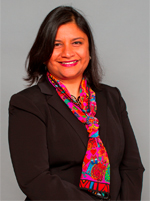University Consortium for Geographic Information Science
"The personal touch was very important...."

The University Consortium for Geographic Information Science represents multi-disciplinary scholars from more than 60 academic institutions, federal agencies, industry partners and international affiliates. UCGIS members are advancing research, education, ethics, and access to geographic information in such fields as cartography (map-making), computer science, landscape architecture, environmental sciences, engineering, land surveying, geodesy (GPS), and geostatistics. Incorporated in 1995 in Washington, D.C., the nonprofit consortium was created to fill the need for balance, cooperation and networking among academic and allied institutions in the then-new field of geographic information science.
“Like all nonprofits, when we started out we filed for our federal tax exemption, organized a board, wrote our bylaws, set our membership fee structure, went about our business and all was well,” says UCGIS President Laxmi Ramasubramanian. “But like all nonprofits, we went through a series of economic up and down cycles. When I took over as president in 2011 we had challenges with our accounting due in part to the economic downturn, as some of our member institutions continued to face restricted budgets. It wasn’t because of anybody’s fault: it was just a combination of difficult economic times coupled with inadequately detailed and robust accounting procedures.”
The challenge with accounting reached a “crisis point,” she says, when the federal tax exemption lapsed. “That’s a pretty serious issue for all nonprofits. I went into a bit of a panic mode. The accounting firms we had previously retained that were supposed to be helping us weren’t very helpful, and I began looking around for a firm that helps nonprofits.”
She did some background checking for companies in the Washington, D.C. area, got a few references and made her first call to Eric.
“What I appreciated most about Eric was that when we sat down to talk he was extremely helpful, not just in offering the services of his firm but also in helping me to see what it means to be president of a nonprofit board. I’m an urban planner: my expertise isn’t finance and accounting. He helped me think through the ramifications of non-compliance with the federal tax-exempt status, and also the need for accountability in the books and reports that our members need.
“Philosophically, these were already my goals as well as some of the highest priorities for the board. He was able to assure me very quickly that he had people in his firm who would help me to operationalize those goals.”
When YPTC staff analyzed records from UCGIS’ previous accountants, an Accounts Receivable inconsistency of over $400,000 was found due to using an accrual method rather than cash. “For a small organization, that’s a big problem,” she says.
Eric spoke to the board. “He basically laid out the concerns and showed us what we need to be thinking about. For us, the key was having the person whose name is on the masthead come and talk to us without being condescending or patronizing, and helping us understand the issues of a small organization like ours. The personal touch was very important.” she adds.
“It was the first time our board had had a conversation with such an accounting professional. We appreciated that he made time to talk with us and help us think through the issues even before we formally engaged YPTC,” she continues.
Concurrently, UCGIS hired a new executive director, Diana Sinton, who lives in Ithaca, N.Y. She and YPTC Associate Teresa Henderson, based in Washington, are working virtually. They have created what Ramasubramanian calls “a new partnership that is making things very productive for us.” YPTC is helping UCGIS to comply with appropriate regulations, ensure that records are not lost, and implement a system of checks and balances.
Ramasubramanian beams with enthusiasm. “We now know practically week-by-week what our finances look like. I’m happy to report that last year we ended in the black. I attribute much of that success to the fact that we now own our accounting processes, that we finally acknowledged that we had some fiscal challenges exacerbated by the previous method of accounting, and that we found professional expertise that understood our problem and is willing to work with us to fix it.
“Our board members are academics who are not experts on financial management. YPTC is helping us to focus maximum energy on our mission.”






